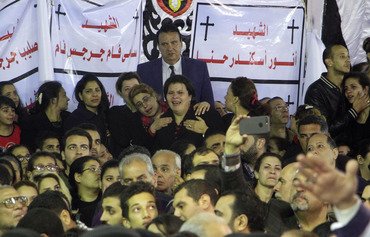Egyptian President Abdul Fattah al-Sisi will on Thursday (August 24th) chair the first meeting of the new Supreme Council to Combat Terrorism and Extremism.
Sixteen officials and 13 counter-terrorism experts are expected to attend.
Al-Sisi announced the council's formation following the April 9th attacks on churches in Alexandria and Tanta claimed by the "Islamic State of Iraq and Syria" (ISIS).
The council is a new step towards confronting armed extremist groups in the region, and is expected to draw up a multilateral plan for combating terrorism.
At its first meeting, the council will most likely discuss its organisational and administrative structure and its plan of action, said council member Brig. Gen. Khaled Okasha, a retired military officer.
"The meeting may specify the committees that will be formed to help the council realise its goals," he told Al-Mashareq.
According to Okasha, the "political leadership is giving huge importance to the success of the council in putting an end to terrorism and preventing the recruitment of young people by extremist groups".
Many topics on the table
The council will discuss a number of issues at its first meeting so it can officially kick off its work, said strategic expert Maj. Gen. Hossam Suwailem.
A top priority "is co-ordination between al-Azhar and security agencies to identify the areas and cities where al-Azhar should educate residents and correct the religious misconceptions that have spread there", he told Al-Mashareq.
Another important issue is finding solutions for the problem of unemployment, particularly in North Sinai, he said, noting that extremist groups have exploited this situation to recruit vulnerable youth.
Another key issue for consideration is the preparation of new laws that are relevant to the times, he added.
At its inaugural meeting, the council also is expected to discuss setting up "a regional entity for combating terrorism and extremism, which will include a number of Middle Eastern countries", Suwailem said.
Other topics will include purging school and university curricula of any content that may incite students against other religions and cultures, he said, and enhancing the teaching of morals, citizenship and acceptance of the other.

![Mourners carry the coffins of victims of the April 9th blast at St. Mark's church in Alexandria during a funeral procession at the Monastery of Marmina in Borg el-Arab on April 10th. [Mohamed el-Shahed/AFP]](/cnmi_am/images/2017/08/23/9331-Egypt-coptic-funeral-600_384.jpg)





